As part of our trip to the two-island republic of Trinidad & Tobago, Ruth and I decided we’d love to take a trip out to Buccoo Reef, off the coast of the smaller island. The place we’ve been staying during the Tobago leg of our visit made a couple of phone calls for us and suggested that we head on down to the boardwalk at nearby Buccoo the next morning where we’d apparently be able to meet somebody from Pops Tours who’d be able to take us out1.
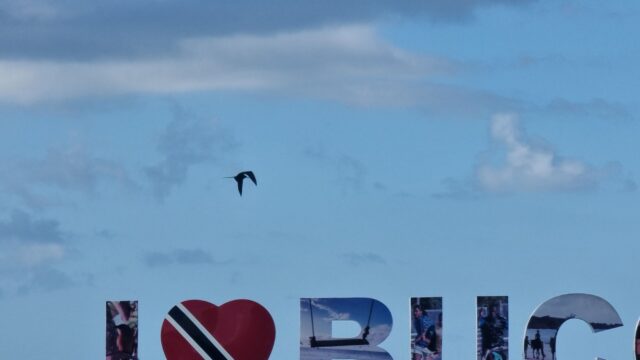
At the allotted time, we found somebody from Pops Tours, who said that he was still waiting for their captain to get there3 and asked us to go sit under the almond tree down the other end of the boardwalk and he’d meet us there.
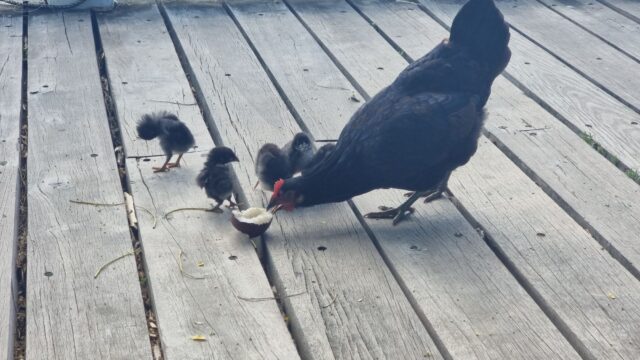
We’d previously clocked that one of the many small boats moored in the bay was Cariad, and found ourselves intensely curious. All of the other boats we’d seen had English-language names of the kinds you’d expect: a well-equipped pleasure craft optimistically named Fish Finder, a small dual-motorcraft with the moniker Bounty, a brightly-coloured party boat named Cool Runnings, and so on. To travel a third of the way around the world to find a boat named in a familiar Welsh word felt strange.
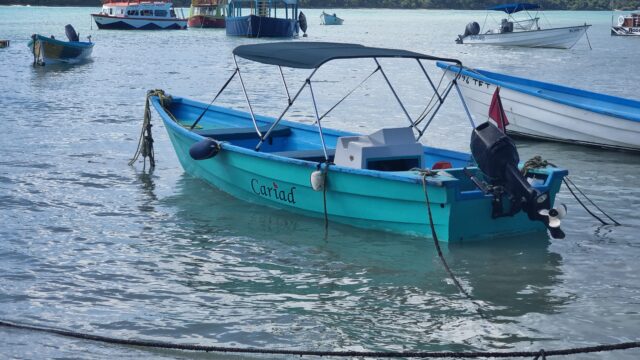
So imagine our delight when the fella we’d been chatting to came over, explained that their regular tour boat (presumably the one pictured on their website) was in the shop, and said that his cousin would be taking us out in his boat instead… and that cousin came over piloting… the Cariad!
As we climbed aboard, we spotted that he was wearing a t-shirt with a Welsh dragon on it, and a sticker on the side of the helm carried a Welsh flag. What strange coincidence is this, that Ruth and I – who met while living in Wales and come for a romantic getaway to the Caribbean – should happen to find ourselves aboard a literal “love” boat named in Welsh.
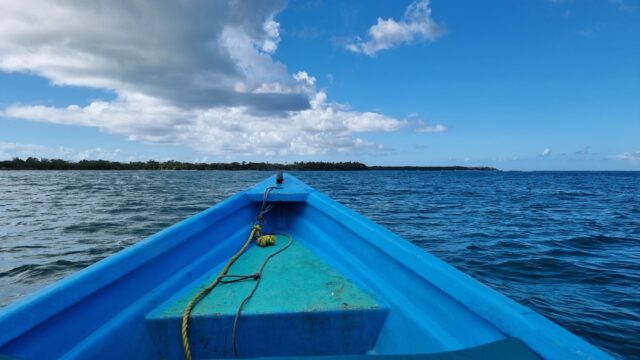
There probably aren’t many boats on Earth that fly both the colours of Trinidad & Tobago and of Wales, so we naturally had to ask: did you name this boat?, and why? It turns out that yes, our guide for the day has a love of and fascination with Wales that we never quite got to the bottom of. He’d taken a holiday to Swansea just last year, and would be returning to Wales again later this year.
It’s strange to think that anybody might deliberately take a holiday from a tropical island paradise to come to drizzly cold Wales, but there you have it. It sounds like he was into his football and that might have had an impact on his choice of destination, but choose to believe that maybe there’s a certain affinity between parts of the world that have experienced historical oppression at the hands of a colonial English mindset? Like: perhaps Nigerians would enjoy India as a getaway destination, or Guyanans would dig Mauritius as a holiday spot, too?5
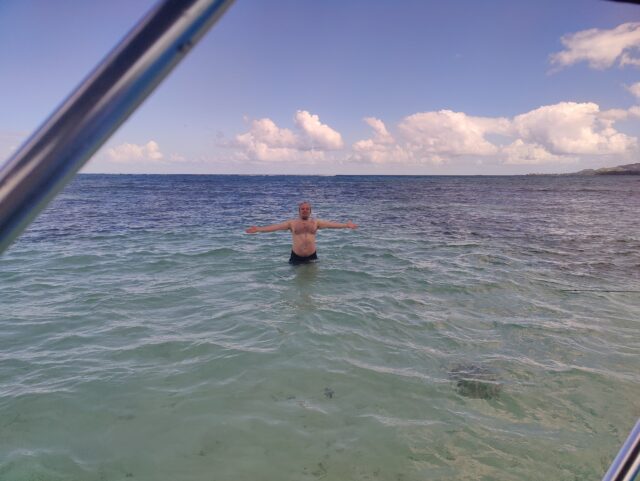
We took a dip at the Nylon Pool, snorkelled around parts of Buccoo Reef (replete with tropical fish of infinite variety and colour), spotted sea turtles zipping around the boat, and took a walk along No Man’s Land (a curious peninsula, long and thin and cut-off from the mainland by mangrove swamps, so-named because Trinidadian law prohibits claiming ownership of any land within a certain distance of the high tide mark… and this particular beach spot consists entirely of such land, coast-to-coast, on account of its extreme narrowness. All in all, it was a delightful boating adventure.
(And for the benefit of the prospective tourist who stumbles upon this blog post in years to come, having somehow hit the right combination of keywords: we paid $400 TTD6 for the pair of us: that’s about £48 GBP at today’s exchange rate, which felt like exceptional value for an amazing experience given that we got the expedition entirely to ourselves.)
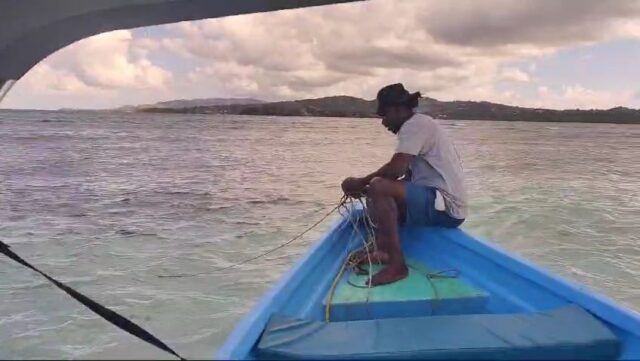
But aside from the fantastic voyage we got to go on, this expedition was noteworthy in particular for Cariad and her cymruphile captain. It feels like a special kind of small-world serendipity to discover such immediate and significant common ground with a stranger on the other side of an ocean… to coincide upon a shared interest in a culture and place less-foreign to you than to your host.
An enormous diolch yn fawr7 is due to Pops Tours for this remarkable experience.
Footnotes
1 Can I take a moment to observe how much easier it was to charter a boat in Tobago than it was in Ireland, where I left several answerphone messages but never even got a response? Although in the Irish boat owners’ defence, I was being creepy and mysterious by asking them to take me to random coordinates off the coast.
2 It’s possible that I’ve become slightly obsessed with frigatebirds since arriving here. I first spotted them from our ferry ride from Trinidad to Tobago, noticing their unusually widely-forked tails, striking white (in the case of the females) chests, and relatively-effortless (for a seabird) thermal-chasing flight. But they’re really cool! They’re a seabird… that isn’t waterproof and can’t swim… if they land in the water, they’re at serious risk of drowning! (Their lack of water-resistant feathers helps with their agility, most-likely.) Anyway – while they can snatch shallow-swimming prey out of the water, they seem to prefer to (and get at least 40% of their food from) stealing it from other birds, harassing them in-flight and snatching it from their bills, or else attacking them until they throw up and grabbing their victim’s vomit as it falls. Nature is weird and amazing.
3 Time works differently here. If you schedule something, it’s more a guideline than it is a timetable. When Ruth and I would try paddleboarding a few days later we turned up at the rental shack at their published opening time and hung out on the beach for most of an hour before messaging the owners via the number on their sign. After 15 minutes we got a response that said they’d be there in 10 minutes. They got there 20 minutes later and opened their shop. I’m not complaining – the beach was lovely and just lounging around in the warm sea air with a cold drink from a nearby bar was great – but I learned from the experience that if you’re planning to meet somebody at a particular time here, you might consider bringing a book. (Last-minute postscript: while trying to arrange our next accommodation, alongside writing this post, I was told that I’d receive a phone call “in half an hour” to arrange payment: that was over an hour ago…)
4 Come for the story of small-world serendipity; stay for the copious candid bird photos, I guess?
5 I’ll tell you one thing about coming out to Trinidad & Tobago, it makes you feel occasionally (and justifiably) awkward for the colonial era of the British Empire. Queen Elizabeth II gave royal assent to the bill that granted the islands independence only in 1962, well within living memory, and we’ve met folks who’ve spoken to us about living here when it was still under British rule.
6 Exceptionally-geeky footnote time. The correct currency symbol for the Trinidad & Tobago Dollar is an S-shape with two vertical bars through it, which is not quite the same as the conventional S-shape with a single vertical bar that you’re probably used to seeing when referring to e.g. American, Canadian, or Australian dollars. Because I’m a sucker for typographical correctness, I decided that I’d try to type it “the right way” here in my blog post, and figured that Unicode had solved this problem for me: the single-bar dollar sign that’s easy to type on your keyboard inherits its codepoint from ASCII, I guessed, so the double-bar dollar sign would be elsewhere in Unicode-space, right? Like how Unicode defines single-bar (pound) and double-bar (lira) variants of the “pound sign”. But it turns out this isn’t the case: the double-bar dollar sign, sometimes called cifrão (from Portugese), and the single-bar dollar sign are treated as allographs: they share the same codepoint and only the choice of type face differentiates between them. I can’t type a double-bar dollar sign for you without forcing an additional font upon you, and even if I did it wouldn’t render “correctly” for everybody. Unicode is great, but it’s not perfect.
7 “Thank you very much”, in Welsh, but you probably knew that already.